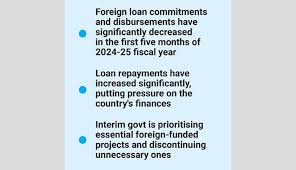Foreign loan disbursements drop as repayments increase
- Update Time : Monday, December 30, 2024

TDS Desk:
Bangladesh is facing a significant shift in its foreign financing landscape, with a sharp decline in both foreign loan commitments and disbursements during the first five months of the 2024-25 fiscal year.
At the same time, loan repayments have risen considerably, putting further strain on the country’s financial position.
According to the Economic Relations Division (ERD), loan commitments dropped by 91.07% and disbursements fell by 27.07% compared to the same period last year. In contrast, loan repayments increased by 28.44%, reflecting a growing pressure on the nation’s financial resources.
During the July-November period, development partners pledged only $522.68 million, a sharp decrease from $5.86 billion in the same period last year. Disbursements also dropped from $2.11 billion to $1.54 billion. At the same time, Bangladesh repaid $1.71 billion in principal and interest, up from $1.33 billion in the previous year.
Experts are concerned about the country’s ability to secure foreign financing for future development projects. The decline in loan commitments and disbursements is linked to global economic uncertainty and concerns about Bangladesh’s economic situation. The rising debt servicing costs may limit the government’s ability to invest in important sectors such as infrastructure and social programmes.
ERD officials also pointed to political unrest in July and August, which disrupted project execution, causing delays and reducing disbursements. Many projects funded by foreign loans were delayed due to the absence of foreign consultants and staff. The government is currently reviewing loan proposals, which has led to a temporary halt in new loan agreements.
Once the review is complete, the government plans to start the loan application process and aims to meet its targets. Development partners like the World Bank and the Asian Development Bank (ADB) have expressed support for funding various projects in Bangladesh.
The interim government is focusing on prioritising essential foreign-funded projects and discontinuing unnecessary ones. ERD has asked agencies to submit a list of priority projects to help determine where foreign loans should be allocated.
During the July-November period, ADB was the largest disbursing partner, contributing $318 million, followed by Japan with $308 million, Russia with $245 million, the World Bank with $205.44 million, and India with $63.42 million.
Dr Zahid Hussain, former lead economist at the World Bank’s Dhaka office, warned that without an increase in revenue collection and improvements in foreign exchange reserves, the growing burden of debt repayments could lead to an economic crisis. He highlighted that the repayment pressures from large projects, including the Padma Bridge, railway connections, and the Bangabandhu Tunnel, are gradually escalating and could have a widespread impact on Bangladesh’s economy.
In FY24, Bangladesh secured $9.88 billion in foreign aid commitments, marking an 8.92% increase from the previous fiscal year.

















